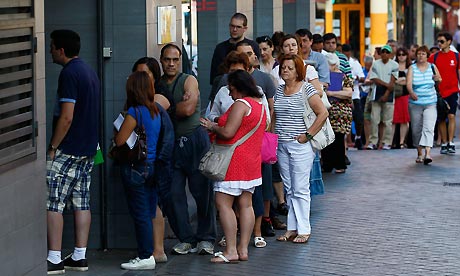Eurozone unemployment rate hits another record high in April 2013
According to official figures, eurozone unemployment rate has reached another record high in April 2013.
The seasonally-adjusted rate for April 2013 was 12.2%, up from 12.1% the month before.
An extra 95,000 people were out of work in the 17 countries that use the euro, taking the total to 19.38 million.
Both Greece and Spain have jobless rates above 25%. The lowest unemployment rate is in Austria at 4.9%.
The European Commission’s statistics office, Eurostat, said Germany had an unemployment rate of 5.4% while Luxembourg’s was 5.6%.
The highest jobless rates are in Greece (27.0% in February 2013), Spain (26.8%) and Portugal (17.8%).
In France, Europe’s second largest economy, the number of jobless people rose to a new record high in April.
“We do not see a stabilization in unemployment before the middle of next year,” said Frederik Ducrozet, an economist at Credit Agricole in Paris.
“The picture in France is still deteriorating.”
Youth unemployment remains a particular concern. In April, 3.6 million people under the age of 25 were out of work in the eurozone, which translated to an unemployment rate of 24.4%.
Figures from the Italian government showed 40.5% of young people in Italy are unemployed.
“We have to deal with the social crisis, which is expressed particularly in spreading youth unemployment, and place it at the centre of political action,” said Italy’s President Giorgio Napolitano.
In the 12 months to April, 1.6 million people lost their jobs in the eurozone.
While the jobless figure in the eurozone climbed for the 24th consecutive month, the unemployment rate for the full 27-member European Union remained at 11%.
The eurozone is in its longest recession since it was created in 1999. At 1.4%, inflation is far below the 2% target set by the European Central Bank (ECB).
Consumer spending remains subdued. Figures released on Friday showed that retail sales in Germany fell 0.4% in April compared with the previous month.
Earlier this week, the Organization for Economic Co-operation and Development (OECD) predicted that the eurozone economy would contract by 0.6% this year.
According to Carsten Brzeski, an economist at ING, in the past, the eurozone has needed economic growth of about 1.5% to create jobs.
Some consider that the ECB needs to do more than simply cutting interest rates to boost economic activity and create jobs.
Earlier this month, the ECB lowered its benchmark interest rate to 0.50% from 0.75%, the first cut in 10 months, and said it was “ready to act if needed” if more measures were required to boost the eurozone’s economic health.
In its report earlier this week, the OECD hinted that the ECB might want to expand quantitative easing (QE) as a measure to encourage stronger growth.
The European Central Bank is due to meet next week.
[youtube tKUT_jY0uqo]

